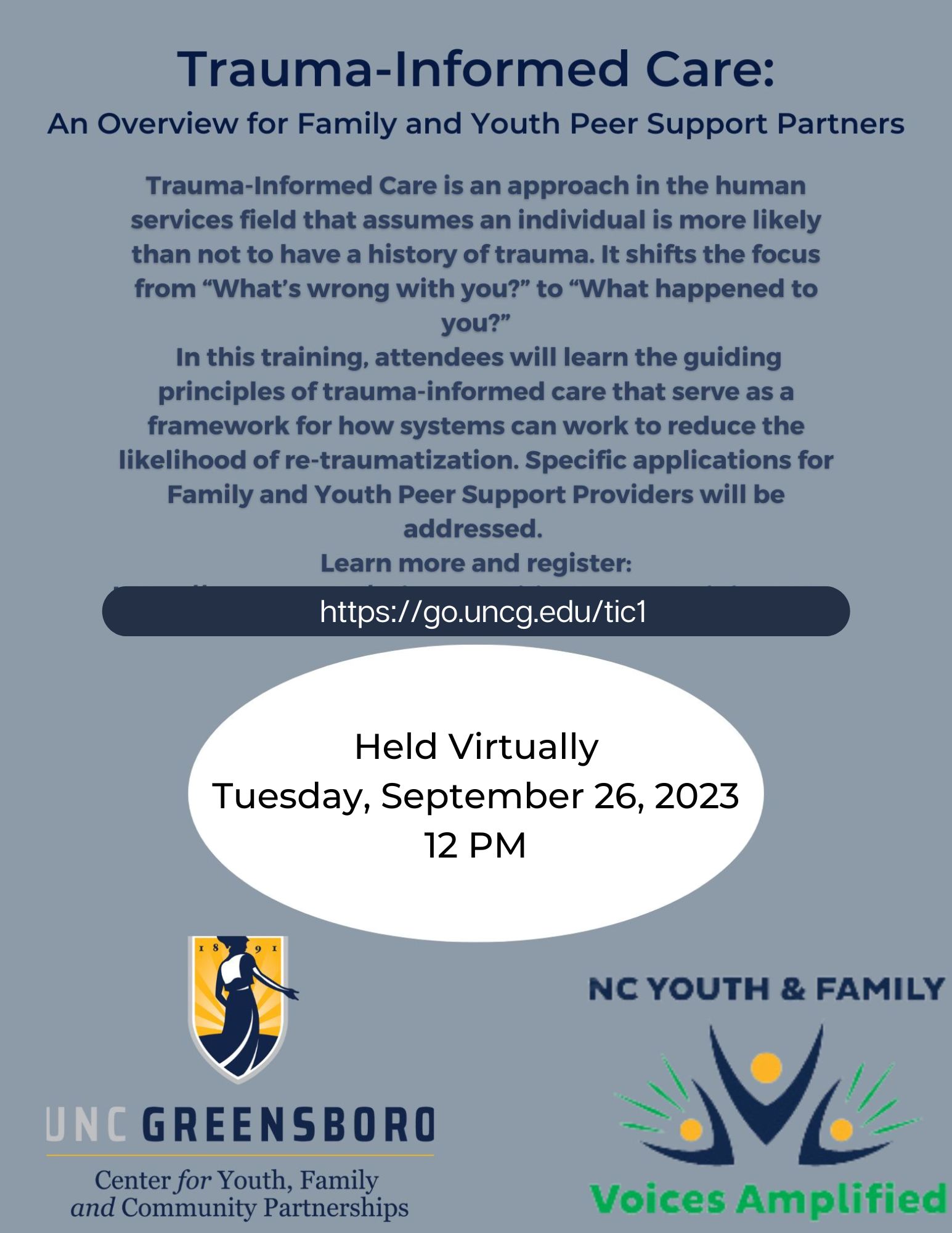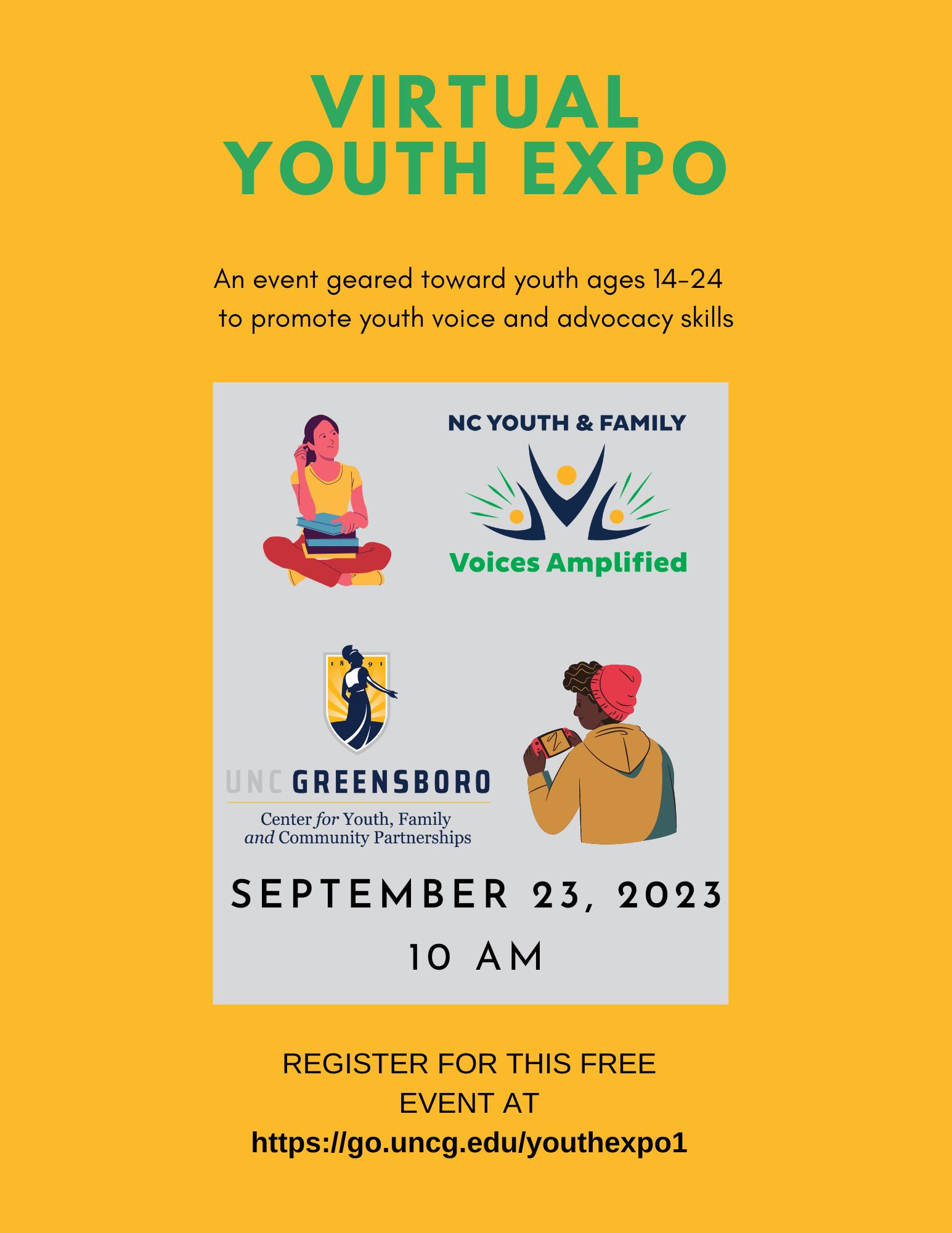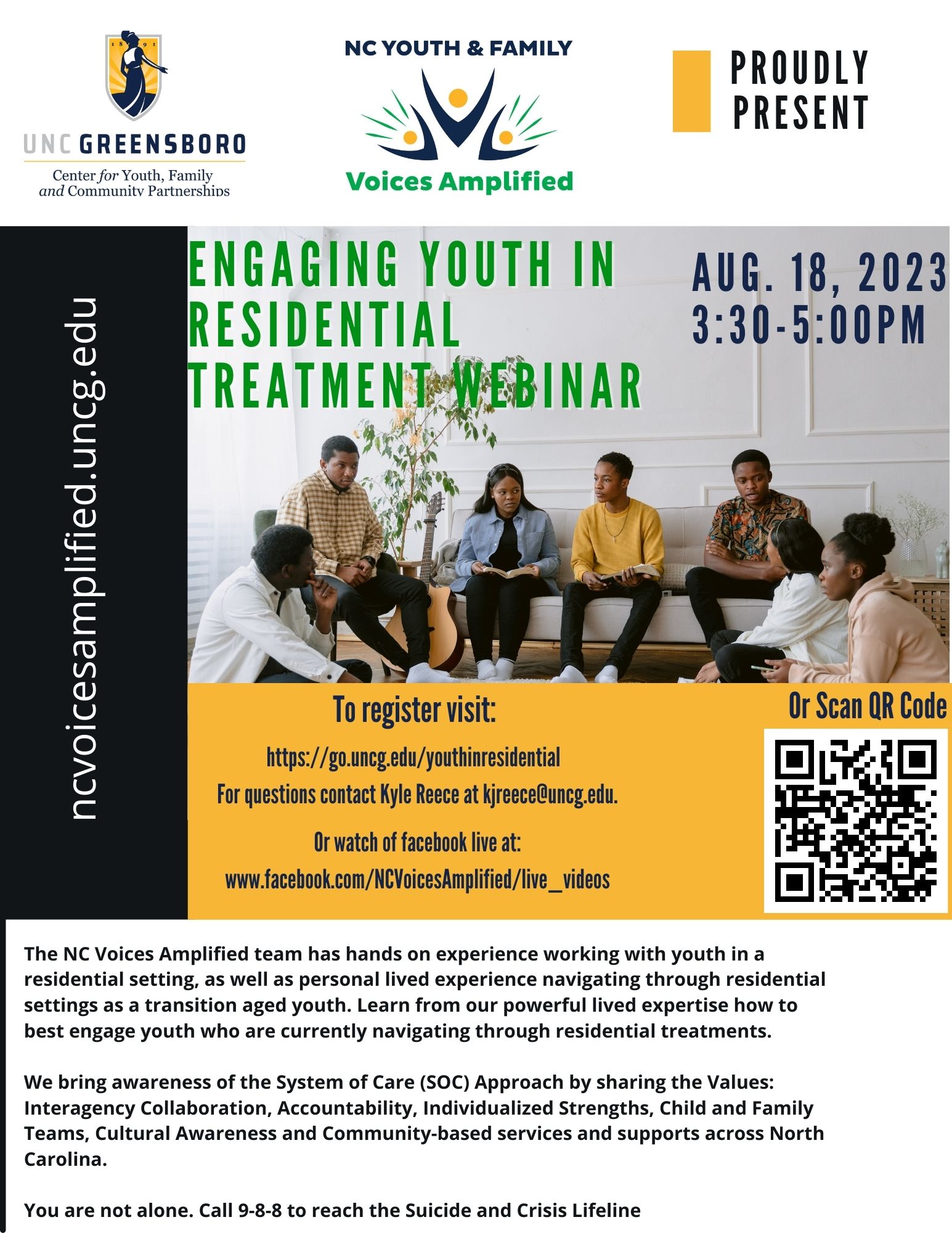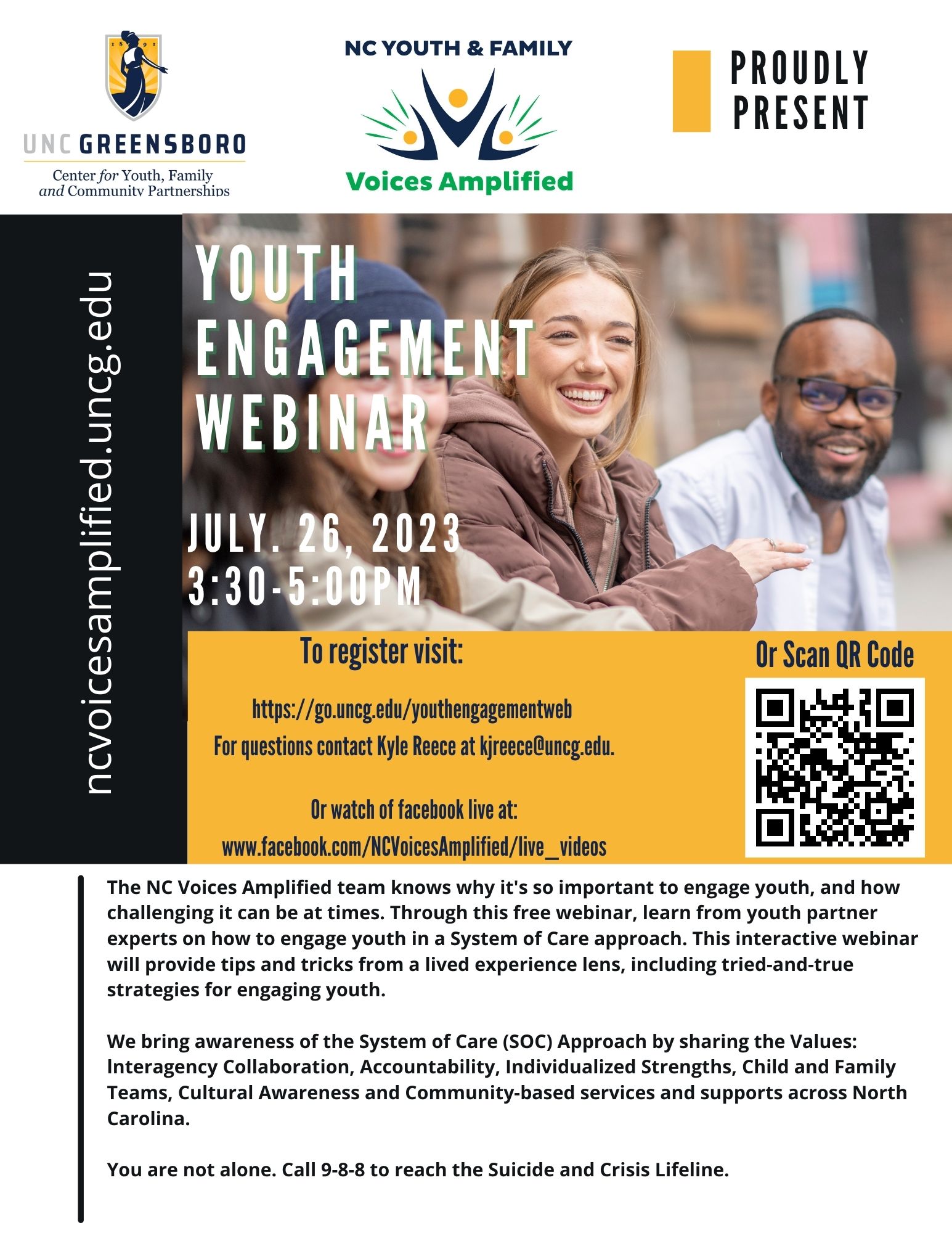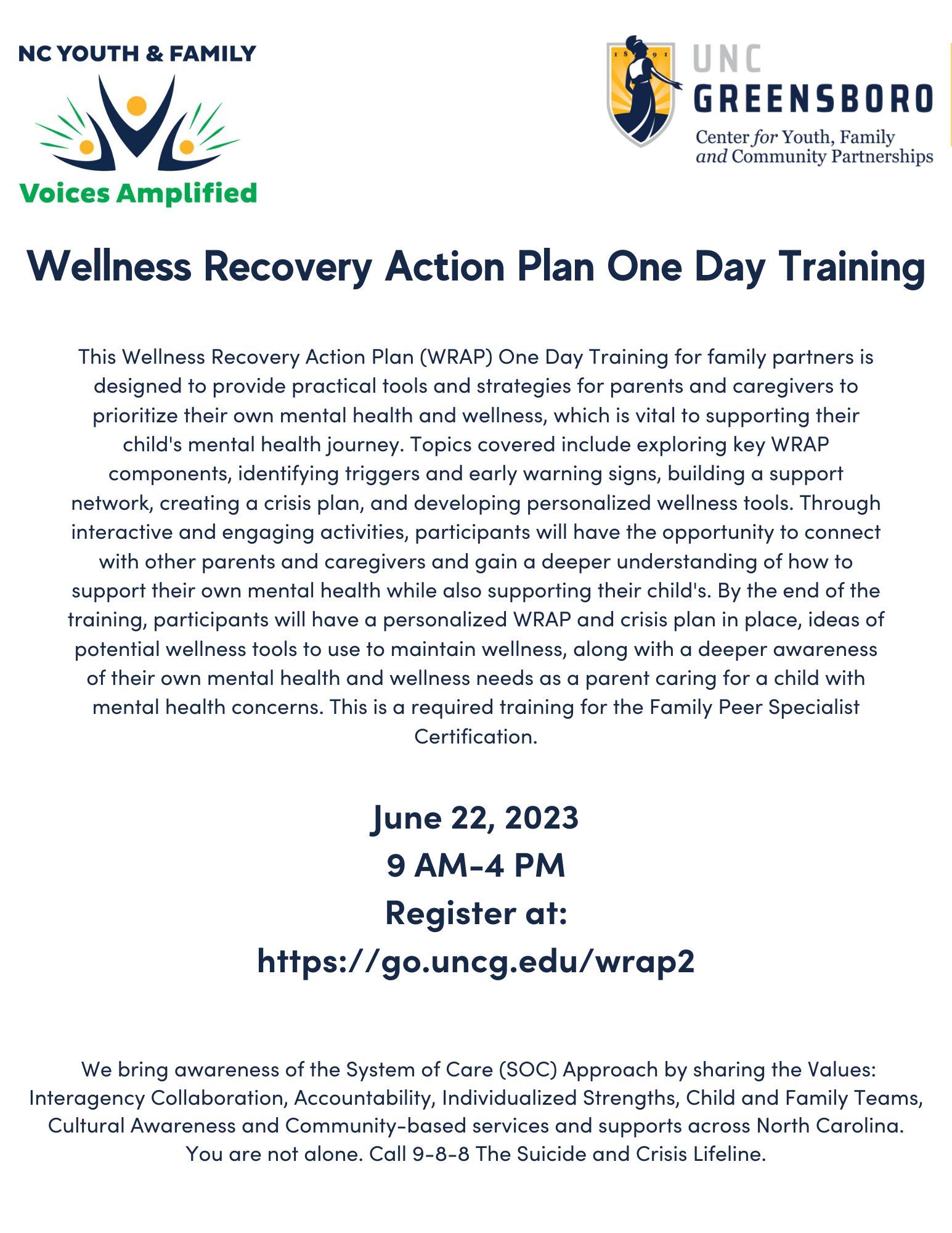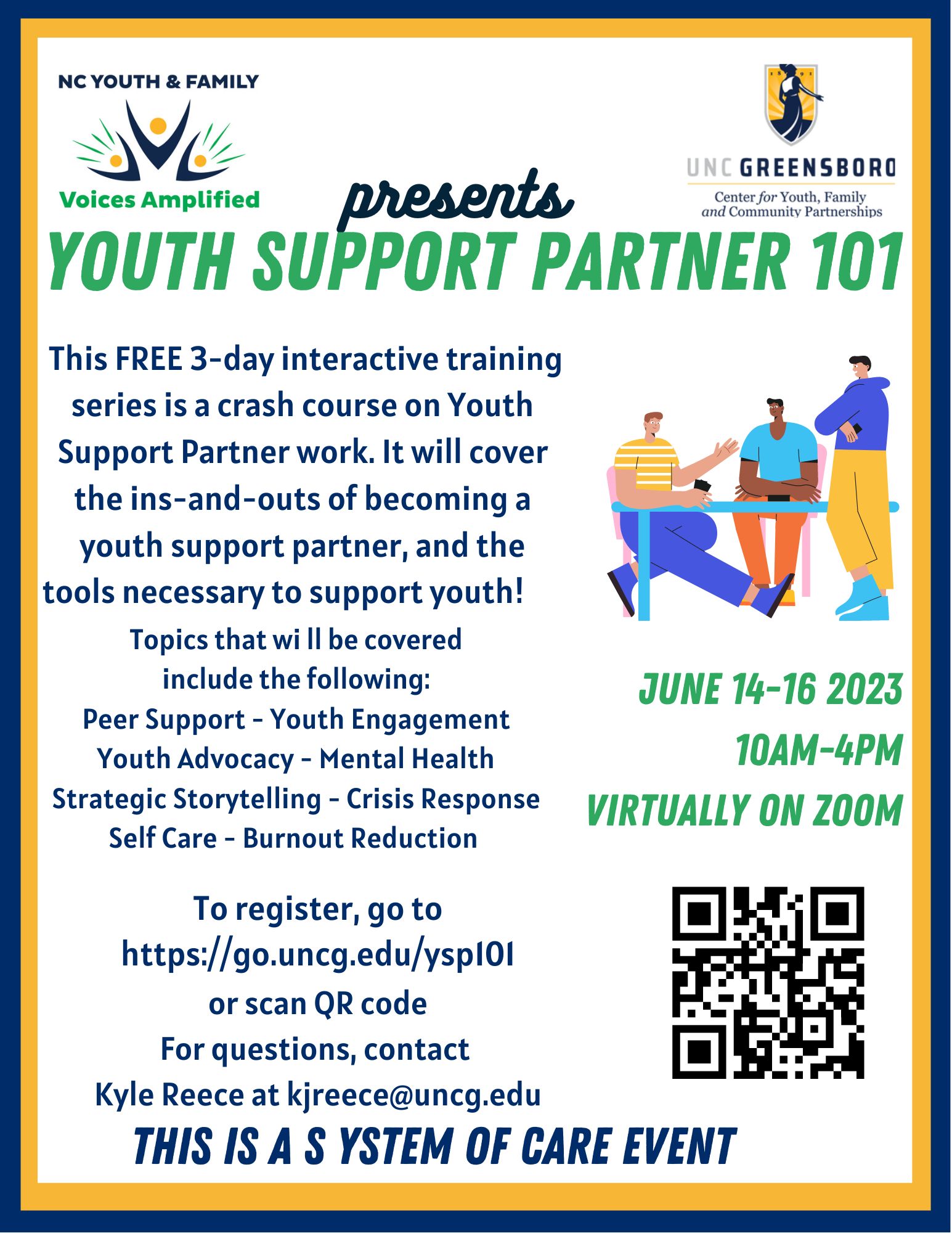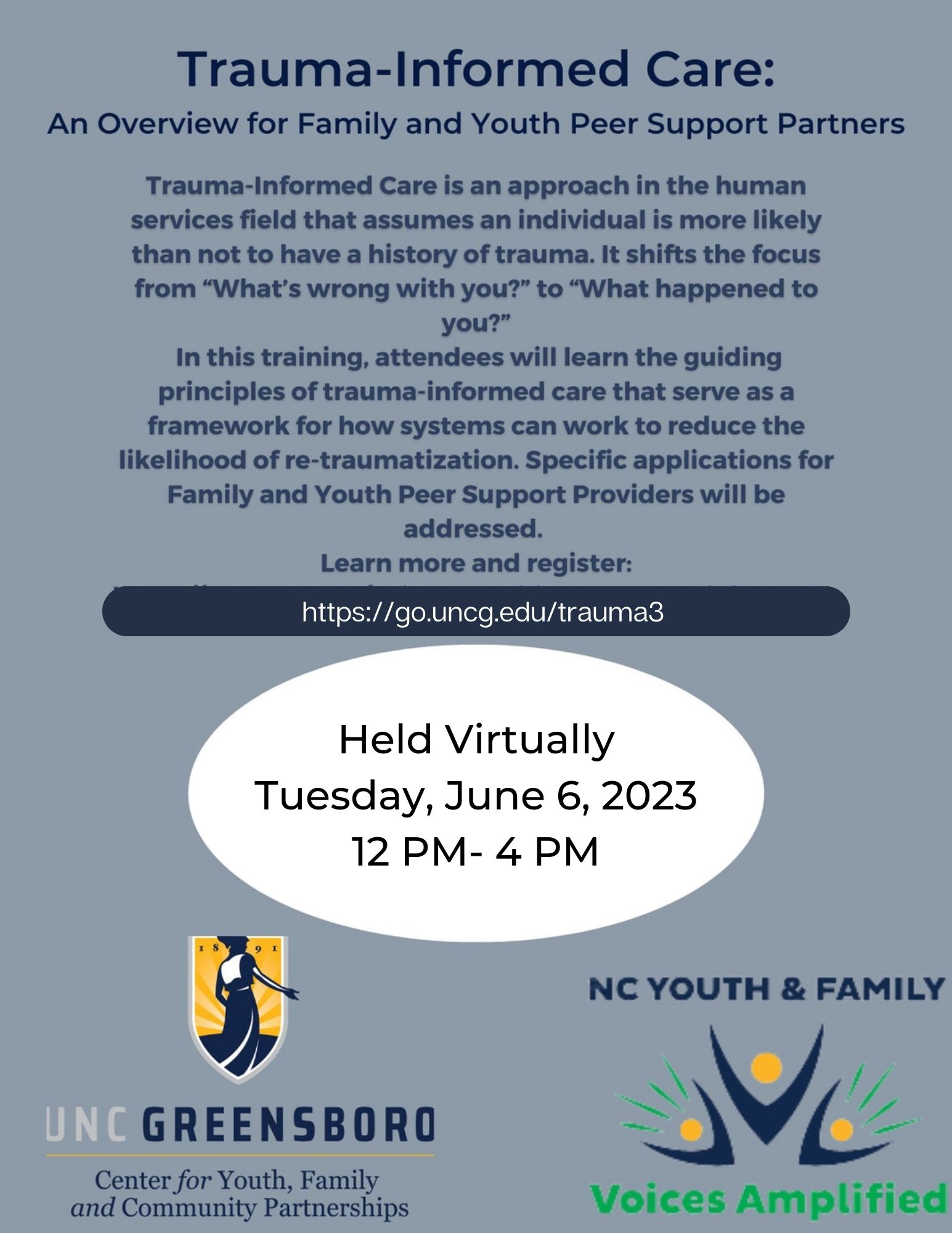The Amplified Voice: Intern Edition
|
| From the Interns’ Desk
This special edition of our quarterly newsletter was created entirely by our Communication and Outreach Interns, Jordan Dumornay and Eli Berry! Over the past few weeks, they’ve connected with leaders from every department across our organization—asking thoughtful questions, gathering insights, and transforming those conversations into stories that highlight the heart of our work. Through their words, you’ll get a fresh perspective on the people, purpose, and passion driving our mission forward. |
|
|
What reach do our trainings have?
|
| We had 271 Registrants in 45 Counties during Quarter 1 of Fiscal Year 2026 |
| Participants from various regions across the state of North Carolina attended the trainings this year. Last quarter, we added new counties to our list of counties reached. Over the course of the lifetime of our program, we’ve reached registrants from 92 of the 100 counties in N.C. |
|
|
Reaping the Benefits of Quarter 1 NCVA Trainings
|
| During Quarter 1 (July 1, 2025 – September 30, 2025), NCVA conducted a total of 13 trainings to reach the public (e.g. youth and families), provide technical assistance for the workforce, and foster systems level change. |
| Training |
Date |
Number of Participants |
| Triple P* |
7/17/2025 |
7 |
| What is Family Peer Support |
7/24/2025 |
3 |
| Navigating Rights and Resources: A Roadmap to Understanding 504s and the IDEA |
8/12/2025 |
24 |
| Family Leadership and Advocacy |
8/14/2025 |
17 |
| System of Care NC from the Family Perspective |
8/20/2025 |
10 |
| Calm (Counseling on Access to Lethal Means) |
8/28/2025 |
20 |
| Trauma Informed Care |
9/4/2025 |
19 |
| Youth Support Partner 101 |
9/8/2025 |
9 |
| Family Support Partner 101 |
9/9/2025 |
11 |
| Youth Engagement Webinar |
9/12/2025 |
14 |
| From Challenges to Change: A Special Education ECHO for Family and Youth Leaders |
9/18/2025 |
9 |
| WRAP (Wellness Recovery Action Plan) |
9/24/2025 |
17 |
| Family Partner Quarterly Meeting |
9/30/2025 |
28 |
|
| *Training facilitated by the Bringing Out the Best program in a collaborative effort to educate Youth Peer Partners and Family Partners being certified through NCVA. |
| Upon completion of the trainings, approximately 99% of the participants indicated being satisfied with the results of the trainings and shared positive feedback on the satisfaction surveys. |
|
|
How many people have we we trained?
|
| We have had over 943 Participants across our 145 trainings so far! |
|
|
Where can I find a Peer Support Professional?
|
| There are currently 28 Certified Family Peer Support professionals in 23 counties
and 24 Youth Peer Support professionals in 19 counties |
|
|
| Frederick Douglas
Family Training Coordinator |
|
Supporting Families, Strengthening Futures
|
| Fred Douglas serves as the Certified Family Training Coordinator at NC Voices Amplified, supporting family peers across North Carolina through training, technical assistance, and consultation with agencies. Her work ensures that family peers can step confidently into their roles while amplifying the voices of children, youth, and families with their lived experience.
Her days look different almost every day—sometimes she’s bringing authentic family peer voices to local, state, and national conversations about children’s mental health. Other days, she’s assessing and providing training for new family peers or helping agencies implement the family peer role. “The most rewarding aspect of my role is providing confidential space and a sounding board for family peers when they are looking for resolutions to difficult challenges they’re having,” she said.
Fred highlights some big wins from this past quarter: “We provided technical assistance to 20 family peers for their certification and recertification, expanded training partnerships to include IDD and first-episode psychosis populations, and recently included a trauma-informed supervision training for youth and peer support.” She also points to a huge step in policy: “We have been part of the conversation around a family peer Medicaid definition. Being able to give voice to the needs of that role and that Medicaid is listening to the expertise of those of us in the field is extremely important.”
She brings her own lived experience into every part of her work. “The reason they were hired is because they have experience. They still may have a lot of support that they may need to provide to their children. They need a family peer that they can also connect with, to give them support and encourage self-care,” she explains. Fred also helps family peers navigate tricky situations in agencies. “I provide that kind of atmosphere for family peers, brainstorming solutions, doing scenarios, and coming up with non-traditional ways of approaching resolutions to issues,” she stated.
Fred draws hope and inspiration from the families she works with. “The hope comes from the resiliency of the families. They continue to look to the next day, deal with circumstances, and look for hope the next day. We now are seen as part of the solution,” said Fred.
And she wants readers to really get why training and supporting family peers matters: “Our greatest success comes when children, youth, and families’ voices, courage, and resiliency are valued and celebrated.”
Through her guidance, support, and advocacy, Fred makes sure family peers are ready and empowered to make a real difference in the lives of families across North Carolina. |
|
|
| Kara Lynch
Communication & Outreach Coordinator |
|
Amplifying Voices, Building Connections
|
| Kara Lynch runs communications and outreach at NC Voices Amplified, managing social media, planning coursework for interns, and preparing exhibits for events and conferences across North Carolina. Her work plays a key role in connecting the organization’s internal efforts with the communities it serves. As Kara explains, “Effective communication and outreach bridges the gap between our internal work and the communities we serve by painting pictures that make sense to community members. For example, a potential YSP can only recognize their lived experience as valuable insight if we share how current youth support partners benefit and develop through our training.”
For Kara, the most rewarding part of her work is seeing that impact click for the people she serves. “I love explaining what we do and hearing people say, ‘I know someone who could benefit from your training program,’” she says. Reflecting on the first quarter, one of her favorite moments was “interviewing and hiring our communications interns for this semester. Just seeing their interest and excitement of learning about what nonprofit communications looks like behind the scenes was refreshing,” said Kara.
Storytelling is central to Kara’s approach. She believes that stories are often the difference between someone simply hearing about NC Voices Amplified’s work and truly seeing themselves or others benefiting from it. “Storytelling is the cornerstone of our program. Effective storytelling is often the difference between someone hearing about what we do and immediately being able to see themselves or someone else benefiting from our training. If I know a story has the potential to give someone else the opportunity to see themselves, I try my best to highlight that story,” she explains.
Ultimately, Kara’s work is deeply voice-centered. “NC Voices NCVA’s work is voice-centered and deeply personal. We are only as successful as the voices we amplify,” she says, reflecting the organization’s commitment to empowering youth and families across North Carolina. |
|
|
| Chandrika Brown
Collaboration Coordinator |
|
Turning Lived Experience Into Lasting Change
|
Every day, Chandrika Brown shows up for families and youth across North Carolina with one clear purpose: to make sure every voice is heard. Her work isn’t just a job, it’s a reflection of her own journey as a parent, advocate, and community leader.
Before her current role even existed, Chandrika was already doing the work fighting to be heard, navigating systems that weren’t built with families in mind, and learning how to overcome barriers to access and understanding. “No one was there to share their voice for me,” she recalls. “So now, I make sure families don’t have to face those same struggles.”
Through her involvement in local collaboratives and advisory boards across the state, Chandrika brings the family and youth perspective to every table. Her lived experience helps bridge the gap between service providers and the families they serve. “We know what it feels like to be on the receiving end,” she explains. “That changes how we approach work. We can help agencies understand that what’s being offered and how it’s delivered really matters.”
Even after years of advocacy, Chandrika continues to learn and grow. Though she admits she’s “not a fan of politics,” she’s embraced the importance of understanding policy so she can better support families and help them access the resources they deserve. Her experiences as a mother and advocate never stop informing her work: “Being a mom and an advocate never stops,” she says with a smile. “It helps me see what’s missing and speak up for what families need.”
Recently, Chandrika was recognized for her dedication, receiving an award from Conrad and Onslow County for being a strong advocate for youth and families. But recognition isn’t what drives her. “We don’t do it for the awards,” she says. “We do it because it’s in our heart.”
For Chandrika, true success isn’t measured in accolades, it’s seen in the lives changed, the barriers broken, and the voices amplified. “Our primary goal is to enhance the voices of families and youth across North Carolina,” she says. “We can’t do that unless we truly understand them, have their back, and make sure their voices are at the center of everything we do.” |
|
|
| Kyle Reece
Youth Training Coordinator |
|
Building Pathways for Youth Voice to Lead
|
For Kyle Reece, success this quarter has meant seeing youth empowerment in motion. Through his leadership in training and technical assistance, Kyle is helping young people and professionals across North Carolina build stronger, more inclusive connections.
“We hosted another successful Youth Peer Support Partner Training this quarter,” Kyle shares. “It’s something we do every few months for young people who want to use their lived experience to support others.” But this quarter brought something new, the first ever Youth Engagement Training, a four hour workshop designed for anyone who works with youth and wants to learn how to engage them more effectively.
The training was a major milestone. “We were proud to see people from all across North Carolina, not just youth, learning how to connect with young people who face mental health challenges,” Kyle says. “It’s about making sure youth feel heard, understood, and supported.”
Kyle has watched the youth peer support role expand statewide, with organizations like managed care agencies (MCOs) beginning to hire more youth peer support partners. “We’ve been advocating for years for the value of youth peer support, and now we’re seeing it take off,” he explains. “Young people are getting trained, professionals are learning how to engage them, and the system is starting to respond.”
His passion for this work comes from personal experience. “Having received mental health support myself, I know how powerful it is to have someone who understands what you’re going through,” Kyle says. “That lived experience makes a difference; it gives hope and a sense of belonging to young people facing challenges.”
Across community collaboratives, Kyle has seen real change. “We’ve had more youth-led events like a mental health day in Chatham County this August where young people explored positive coping skills like meditation, art, and healthy sleep,” he shares. “We’re also seeing more youth with lived experience joining collaboratives and shaping residential programs. Their voices are making an impact.” |
|
|
| Sherrell Hicklen House, Ph.D.
Associate Director of Research, Evaluation, and Grant Development |
|
Numbers With Meaning: Tracking Our Impact
|
| Sherrell House serves as the Associate Director of Research, Evaluation, and Grant Development at NC Voices Amplified, bringing her expertise in research and evaluation to programs that impact youth and families across North Carolina. She leads efforts to assess program effectiveness, write grants, and identify opportunities to better integrate services for the community.
Since joining NC Voices Amplified, Sherrell has focused on bridging research, evaluation, and community impact. “I was excited to come in, evaluate these amazing programs that we already have, and look at the effectiveness so that we can continue these programs—but also write grants to create new programs for youth and families in the community,” she explains. Her background as a faculty member in child development and family studies gives her a unique perspective, allowing her to bring research-driven insight to practical evaluation.
A central focus of Sherrell’s approach is combining data with community voices. “Include the numbers, like this is what we found,but I always pull in the quotes. It connects really, really greatly with those numbers and helps to tell the whole story,” she said. She emphasized that qualitative feedback from youth and family partners is just as important as quantitative results. “It’s the numbers plus the narrative—the first-hand experiences—that tell the full story,” she added.
For Sherrell, the most rewarding part of her work is seeing how these programs create real impact. “It’s exciting to watch programs I evaluate make a difference in communities, even if we’re not working directly with families. We are indirectly impacting families by working with the folks who will be working with them,” she explains. By evaluating trainings for family and youth partners, she ensures that participants are empowered to support families effectively.
Reflecting on the NC Voices Amplified team, Sherrell highlights the passion that drives their work. “NC Voices Amplified has a staff full of folks that are passionate about the work that they do and passionate about healthy developmental outcomes for youth and families. We all come from different walks of life, we all have different roles, but it’s all for one common goal,” she said.
Sherrell’s work demonstrates that evaluation is not just about numbers—it’s about connecting research, community voice, and program development to create meaningful, lasting change for youth and families across North Carolina. |
|
|
| Willow Burgess-Johnson
Program Manager |
|
Listening Deeply and Leading With Lived Experience
|
Every day, Willow shows up for families and young people with one guiding belief, that those most affected by the system should have the loudest voice in changing it. “One of the values of our program is listening deeply,” she says. “We reach out regularly to families, youth peers, and family peers to ask what they’re seeing as the real needs out there not just in numbers, but in lived experience.”
Through continual needs assessments and open dialogue, Willow and her team make space for honest conversation. “We provide regular opportunities for family peers to come together and talk about their experiences,” she explains. “It’s about creating room for those voices to shape what comes next.”
Willow’s commitment to family and youth driven care doesn’t stop there. Her team also ensures that lived experience is represented at every level, serving on advisory boards across child welfare, juvenile justice, physical health, and developmental disability systems. “We want to make sure the youth and family perspective is part of every decision,” Willow shares.
Her leadership is deeply rooted in empathy and personal experience. Having started her career as a domestic violence advocate and later as a licensed clinical social worker, Willow learned early on that real understanding comes from the people she serves. “I learned much more from the families I supported than I ever did out of a book,” she says. “And when I faced my own challenges with mental health and my child’s challenges, it opened my eyes even more. Navigating these systems firsthand changes how you lead.”
That perspective has shaped Willow’s passion for peer support, a cornerstone of recovery that values lived experience as expertise. “Peer support doesn’t just help individuals it helps systems learn,” she explains. “It gives direct feedback about what’s working and what isn’t, and that’s how we grow stronger.”
As North Carolina faces a behavioral health workforce shortage, Willow sees peer support as both a solution and a source of hope. “Peer support naturally brings more diversity and representation into the field,” she says. “We just need to make sure peers have the infrastructure, understanding, and career growth they deserve.”
Looking ahead, Willow is most excited about the opportunity for cross system collaboration where child welfare, education, juvenile justice, and healthcare work together instead of apart. “My not so hidden agenda,” she says with a smile, “is to see youth and family peer support in every child serving system across North Carolina. That’s how we bridge the gaps and make sure every family has the support they need.”
For Willow Burgess-Johnson, leadership is about more than strategy; it’s about listening deeply, leading with empathy, and building systems that honor every voice. Her work is a reminder that when lived experience leads, transformation follows. |
|
|
| Call or Text the 24/7 Lifeline at 9-8-8 |
|
|
| Scan (or click) the QR Code below to join our Listserv! |
|
|
Manage your preferences | Opt Out using TrueRemove™
Got this as a forward? Sign up to receive our future emails.
View this email online. |
| 1400 Spring Garden St. | Greensboro, NC 27402 US |
|
|
This email was sent to kdlynch@uncg.edu.
To continue receiving our emails, add us to your address book. |
|
|
|
